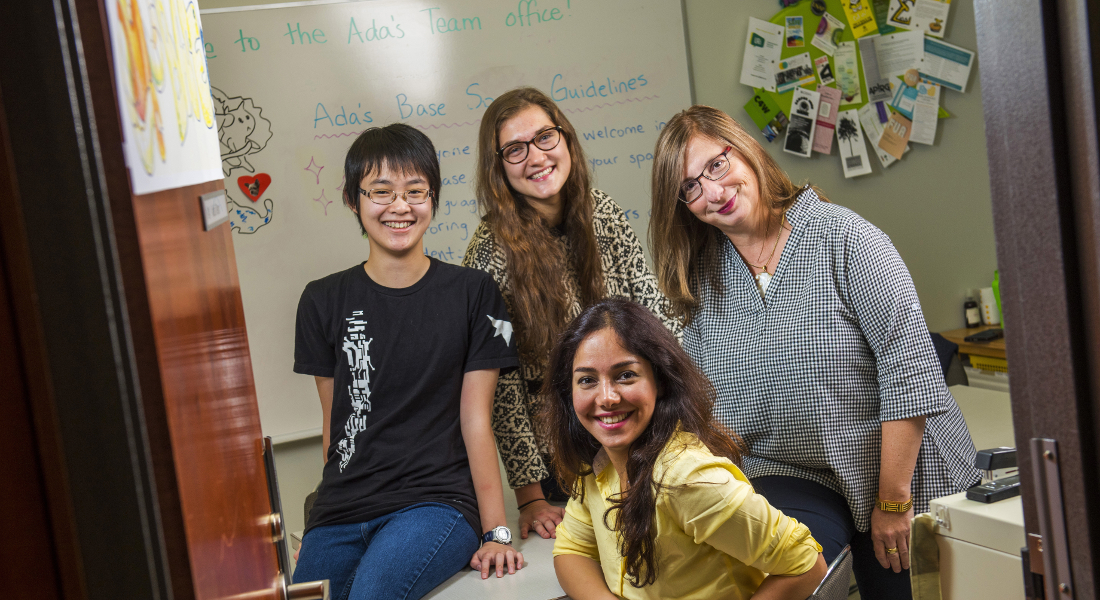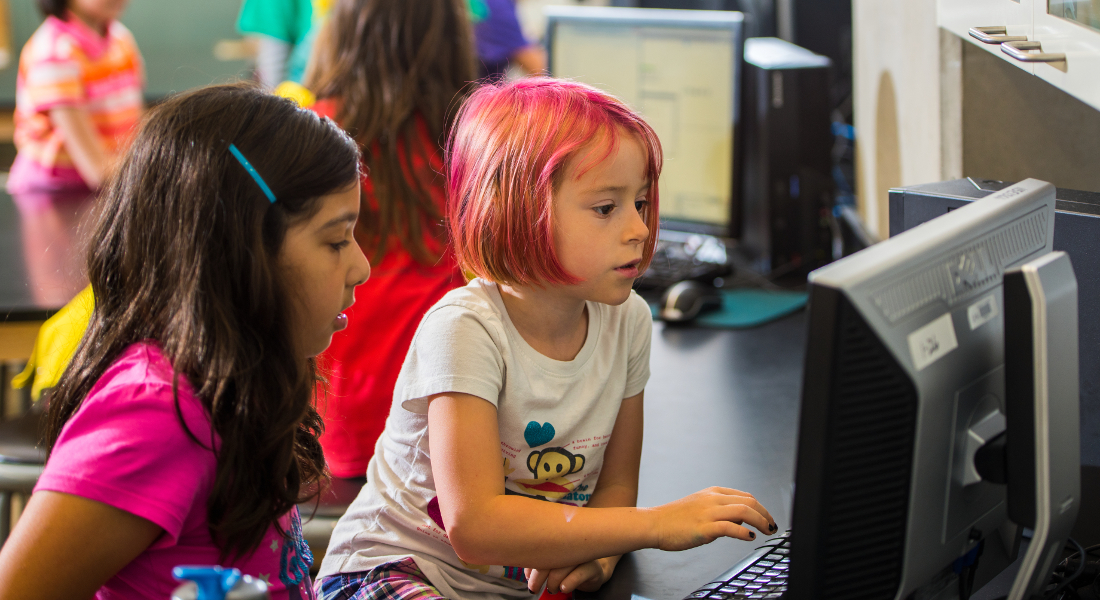
Eleni Stroulia (top right), Ghazal Jangani (seated) and members of Ada's Team pictured in Ada's Base.
In 1843, Ada Lovelace published notes describing the "Analytical Engine," a device that would later form the basis for all modern computers. As a result of her contributions, Lovelace is often regarded as the first computer programmer-though she lived and died a century before the advent of modern computers. She was a woman ahead of her time, rising above socially sanctioned restrictions regarding what role women should (or, more accurately, should not) have in science and technology.
Nearly two centuries later, we've come a long way-but not nearly far enough. After a brief increase in the late-20th century, the number of women graduating from computing science programs actually seems to be declining. In a 2015 article she wrote for Scientific Computing, Maria Klawe ('73 BSc, '77 PhD, '07 DSc), Harvey Mudd College president and UAlberta alumna, summarizes the problem:
While the number of undergraduate women pursuing some STEM (science, technology, engineering, math) fields like biology and chemistry has steadily increased over the past couple of decades, women's participation in computer science (CS) has actually been declining.
Indeed, within the last 20 years the percentage of undergraduate women who received CS degrees plummeted by almost 40%. According to the American National Science Foundation (NSF), in 1995 29% of bachelor's degrees in CS were awarded to women; by 2012, the most recent year for which NSF data is available, only 18% of CS undergraduates were women.
These statistics are similarly reflected here at the Faculty of Science. Although female students represent slightly more than 50 per cent of total undergraduates, female students are outnumbered roughly five to one in computing science. The reasons for this are multifaceted and complex, many of them sociocultural biases that are often established at a young age.
"The situation is bad, and my own personal perspective on my classrooms does not show visible improvement at the undergraduate level," says Eleni Stroulia, professor in the Department of Computing Science. "There is still a lot to be done to encourage women first, to pursue these careers and second, to not drop out when they find themselves in a minority group in their classes."
Feeling unwelcome or out of place in class may not seem like a huge issue-after all, most university students will take courses that push them out of their comfort zone at some point in their studies. But this feeling can set off a chain reaction. "It takes time to find other women in your classes, to connect with mentors, and to make friends with people of the opposite sex; and in the meantime, it really feels like you don't belong to this area," says Ghazal Jangani, a third-year computing science student. "University can be a challenging experience for any student, so these small additional stresses can have a serious impact on students' grades and overall mental health."
One of the biggest challenges faced by women and other minorities, explains Stroulia, is loneliness in the face of challenge. "Loneliness is dangerous, especially in the face of adversity, and a support system is essential if we want to retain and mentor and help the women in our department reach their potential," she says. "Everyone needs a support group, and it is difficult to form one when you feel unlike everyone else around you. It is easy, then, to think that the reason why you are facing difficulties is because you are not 'meant' to be in the program."
In an effort to establish such a support group, Stroulia helped to found Ada's Team in 2013, a UAlberta student group created to establish a community for women and marginalized people in computing science and technology.
With Stroulia acting as faculty liaison, Ada's Team was established by a dozen computing science undergraduate and graduate students, mostly women, as well as professors and administrators in the Faculty of Science. The group formed initially out of a shared interest in attending the Grace Hopper Celebration for Women in Computing, designed to bring the research and career interests of women in computing to the forefront. After several planning meetings for this conference, they decided to apply for official student group status.
"After we had all met through interest in the Grace Hopper Celebration, we started talking about things like impostor syndrome, isolation, and being a small minority in many of our computing science courses," says the group's first president, Sarah Beck ('14 BSc), now a software developer at BioWare. "Together, we thought it would be awesome to create a group where we could support each other."
Inspired by other women in computing science groups at U.S. universities as well as other female-specific tech groups like the Systers online community, Ada's Team knew its first and most important objective would be to find a visible, accessible space in the Computing Science Centre. In addition to providing a safe and positive space on campus for young women to meet and share the experiences that concern and frustrate them, the office is often used to offer in-house support to CS students, including free tutoring sessions and drop-in activities.
"Because it's 2016"
There is no question of the group's value to the U of A. When asked about the value of encouraging diversity in computing science, Computing Science Chair Mario Nascimento says, "I could paraphrase our prime minister and simply say that it is because it is 2016."
He adds, "computing science, as with many of the other so-called STEM disciplines, has been thought to be a 'man's discipline' for many, many years. There has never been a reason for that to be even close to true."
Financial support from the Department of Computing Science and the Faculty of Science has enabled the group to send women to attend the Grace Hopper conference who otherwise wouldn't be able to afford to go. "Many benefited through this experience in finding ways to cope with isolation or stress, for example, or even finding employment through recruiters they met through the conference," says Beck. "I know one woman got a job with Apple through a recruiter she met at the conference."
Don't think you fit the CS "type"?
Stroulia: The "type" is an accident, and it should play no role in what you choose to do in your life.
Beck: Computing science is for you. There are so many diverse fields and applications that programming applies to. You can work in games, medicine, chemistry, web design, security, robotics, music, and art. I guarantee you the problem- solving skills you pick up when learning programming will be applicable to a career in whatever field you desire.
If you don't have the time or desire to study computing science at an academic institution, I still insist you try coding. It's fun and rewarding, and anyone can learn how to program with a little hard work.
Jangani: Never give up, and never let your unconscious mind hold you back from what you like and feel you are capable of doing. The world will never stop for you to go back and change your decisions, so believe in yourself and always stand and fight for what you want. Try to make the changes and do not let the next person after you feel what you don't like to feel today.
Stroulia hopes to see more actions taken by industry to spark a trickle-down effect of positive change. "My original motivation for working on this issue is equity and social justice: CS and software engineering (my own area of study) are among the best paying and most versatile jobs today, and I refuse to accept the situation that a segment of the population-women-is being excluded from them."
She advocates for companies to offer more high school internships to young women and to be more critical in self-evaluations of their own efforts to increase diversity. "I would like every technical organization to reflect on their membership and set realistic targets and strategies for improving their gender diversity," she says.
Though progress in the field seems slow, there is renewed hope with the growth of initiatives like WISEST (Women in Scholarship, Engineering, Science & Technology) and Ada's Team. Providing safe and supportive communities helps enable champions for a more diverse future in computing science and makes the small ripples that will someday grow into waves of social change.
Looking forward, the group hopes to continue supporting students on campus while also extending their reach beyond campus, helping, for example, with all-girls coding summer camps. They also host a monthly Coffee and Code event to help students break the ice and connect with peers. Students have the opportunity to help each other with school projects, with the added benefit of ensuring everyone feels a little less alone.
"We are all trying so hard to achieve a gender balance, and with the help and support of our department, it becomes easier to promote our goal and see changes in this field," says Ghazal Jangani, one of the team's vice-presidents. "Having people who can understand that makes a world of difference and allows us to see the progress we expect to see."
Adds Nascimento, "Ada's Team is a much-needed conduit, perhaps a catalyst of sorts, that will identify issues related to diversity-or to the lack thereof- that will help evaluate possible solutions and will finally help implement them."
